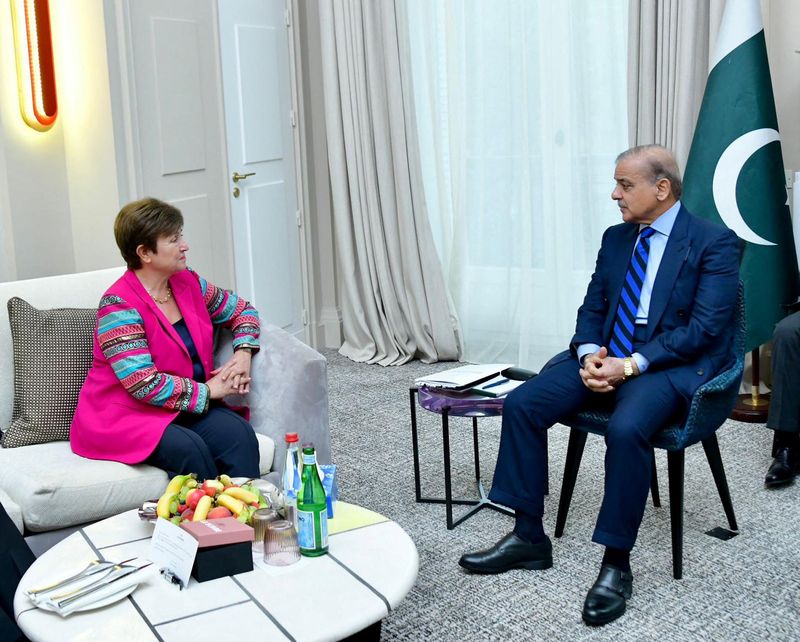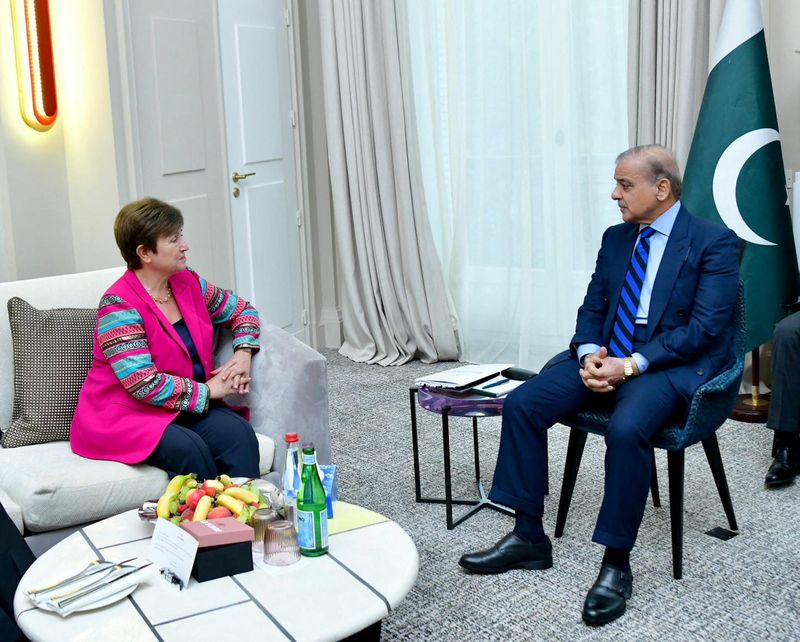Economy
Pakistan, IMF discuss $2.5 billion standby arrangement -domestic media


© Reuters. FILE PHOTO: Pakistan Prime Minister Shehbaz Sharif meets with managing director of the International Monetary Fund (IMF), Kristalina Georgieva, in Paris, France June 22, 2023. Press Information Department (PID)/Handout via REUTERS/File Photo
2/2
ISLAMABAD (Reuters) – Pakistan and the International Monetary Fund are discussing a $2.5-billion “standby arrangement” for six to nine months, domestic newspapers said on Wednesday, with the current bailout programme set to expire on June 30.
Pakistan rushed through a recent slew of policy adjustments, including a revised budget sought by the IMF and an off-cycle hike in interest rates, hoping to secure the pending funds under the Extended Fund Facility programme (EFF) signed in 2019.
With time running out, Finance Minister Ishaq Dar said on Tuesday the two sides were working on a “mechanism” to ensure that Pakistan got the entire amount and not just the close to $1.1 billion due under the current review.
Dar did not elaborate on what the mechanism was.
The ninth review is in order after recent adjustments but Pakistan is keen to receive the entire undisbursed amount, which is only possible in a new programme, the Express Tribune daily said, quoting highly-placed sources.
It said Prime Minister Shehbaz Sharif discussed signing a new stand-by arrangement (SBA) worth $2.6 billion for a short term of six months with IMF Managing Director Kristalina Georgieva.
The IMF’s resident representative Esther Perez and Dar did not respond to a Reuters request for comment.
Pakistan’s Dawn newspaper also said an SBA was one option discussed to access pending funds after expiry of the EFF.
The south Asian nation is in dire need of external financing and has allocated $2.5 billion in IMF support in its annual budget, which will also be key to unlock other avenues of funding.
On Tuesday, Prime Minister Shehbaz Sharif said he expected an agreement in a day or two, with the lender saying it was holding talks with the aim of “quickly reaching an agreement on financial support from the IMF”.
It did not say if the financing was part of the EFF or a new SBA.
Pakistan’s international bonds rallied sharply for a third straight session amid rising hopes of IMF funding.
The gains were most pronounced in shorter-dated issues, with the 2024 bond up more than 3 cents in the dollar to trade just above 60 cents – its highest level since early February and up more than 10 cents since the start of the week, Tradeweb data showed.
Longer-dated maturities gained about 1.5 cent.
Economy
Russian central bank says it needs months to make sure CPI falling before rate cuts -RBC


© Reuters. Russian Central Bank Governor Elvira Nabiullina attends a news conference in Moscow, Russia June 14, 2019. REUTERS/Shamil Zhumatov/File Photo
MOSCOW (Reuters) – Russia’s central bank will need two to three months to make sure that inflation is steadily declining before taking any decision on interest rate cuts, the bank’s governor Elvira Nabiullina told RBC media on Sunday.
The central bank raised its key interest rate by 100 basis points to 16% earlier in December, hiking for the fifth consecutive meeting in response to stubborn inflation, and suggested that its tightening cycle was nearly over.
Nabiullina said it was not yet clear when exactly the regulator would start cutting rates, however.
“We really need to make sure that inflation is steadily decreasing, that these are not one-off factors that can affect the rate of price growth in a particular month,” she said.
Nabiullina said the bank was taking into account a wide range of indicators but primarily those that “characterize the stability of inflation”.
“This will take two or three months or more – it depends on how much the wide range of indicators that characterize sustainable inflation declines,” she said.
The bank will next convene to set its benchmark rate on Feb. 16.
The governor also said the bank should have started monetary policy tightening earlier than in July, when it embarked on the rate-hiking cycle.
Economy
China identifies second set of projects in $140 billion spending plan


© Reuters. FILE PHOTO: Workers walk past an under-construction area with completed office towers in the background, in Shenzhen’s Qianhai new district, Guangdong province, China August 25, 2023. REUTERS/David Kirton/File Photo
SHANGHAI (Reuters) – China’s top planning body said on Saturday it had identified a second batch of public investment projects, including flood control and disaster relief programmes, under a bond issuance and investment plan announced in October to boost the economy.
With the latest tranche, China has now earmarked more than 800 billion yuan of its 1 trillion yuan ($140 billion) in additional government bond issuance in the fourth quarter, as it focuses on fiscal steps to shore up the flagging economy.
The National Development and Reform Commission (NDRC) said in a statement on Saturday it had identified 9,600 projects with planned investment of more than 560 billion yuan.
China’s economy, the world’s second largest, is struggling to regain its footing post-COVID-19 as policymakers grapple with tepid consumer demand, weak exports, falling foreign investment and a deepening real estate crisis.
The 1 trillion yuan in additional bond issuance will widen China’s 2023 budget deficit ratio to around 3.8 percent from 3 percent, the state-run Xinhua news agency has said.
“Construction of the projects will improve China’s flood control system, emergency response mechanism and disaster relief capabilities, and better protect people’s lives and property, so it is very significant,” the NDRC said.
The agency said it will coordinate with other government bodies to make sure that funds are allocated speedily for investment and that high standards of quality are maintained in project construction.
($1 = 7.1315 renminbi)
Economy
Russian central bank says it needs months to make sure CPI falling before rate cuts -RBC


© Reuters. Russian Central Bank Governor Elvira Nabiullina attends a news conference in Moscow, Russia June 14, 2019. REUTERS/Shamil Zhumatov/File Photo
MOSCOW (Reuters) – Russia’s central bank will need two to three months to make sure that inflation is steadily declining before taking any decision on interest rate cuts, the bank’s governor Elvira Nabiullina told RBC media on Sunday.
The central bank raised its key interest rate by 100 basis points to 16% earlier in December, hiking for the fifth consecutive meeting in response to stubborn inflation, and suggested that its tightening cycle was nearly over.
Nabiullina said it was not yet clear when exactly the regulator would start cutting rates, however.
“We really need to make sure that inflation is steadily decreasing, that these are not one-off factors that can affect the rate of price growth in a particular month,” she said.
Nabiullina said the bank was taking into account a wide range of indicators but primarily those that “characterize the stability of inflation”.
“This will take two or three months or more – it depends on how much the wide range of indicators that characterize sustainable inflation declines,” she said.
The bank will next convene to set its benchmark rate on Feb. 16.
The governor also said the bank should have started monetary policy tightening earlier than in July, when it embarked on the rate-hiking cycle.

 Forex3 years ago
Forex3 years agoForex Today: the dollar is gaining strength amid gloomy sentiment at the start of the Fed’s week

 Forex3 years ago
Forex3 years agoUnbiased review of Pocket Option broker

 Forex3 years ago
Forex3 years agoDollar to pound sterling exchange rate today: Pound plummeted to its lowest since 1985

 Forex3 years ago
Forex3 years agoHow is the Australian dollar doing today?

 Cryptocurrency3 years ago
Cryptocurrency3 years agoWhat happened in the crypto market – current events today

 World3 years ago
World3 years agoWhy are modern video games an art form?

 Commodities3 years ago
Commodities3 years agoCopper continues to fall in price on expectations of lower demand in China

 Economy3 years ago
Economy3 years agoCrude oil tankers double in price due to EU anti-Russian sanctions





















